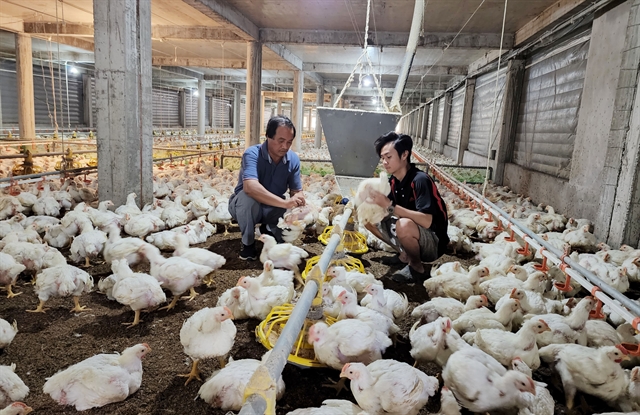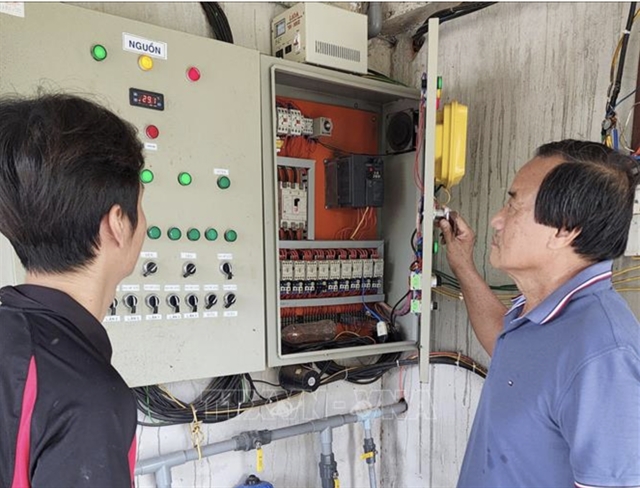 Society
Society


|
| Lê Văn Quyết (left) in his closed, cold henhouse. — VNA/VNS Photo Lê Xuân |
ĐỒNG NAI — A farmer in the southern province of Đồng Nai has been successful in applying high technology in raising chickens for export and helps many other farmers to earn higher income.
Lê Văn Quyết, director of Long Thành Phát Hi-tech Agriculture Co-operative in Long Thành District, who has more than 20 years of experience raising chicken, is one of the pioneer farmers investing in developing large-scale chicken farming that is eligible for export to strict markets like Japan.
He also successfully established the first high-tech agricultural co-operative to raise chickens for export.
With the determination to raise sick-free chickens and protect the environment, Quyết spent a lot of time researching high-tech chicken farming models in the world before setting up his own.
When visiting open chicken farms, his biggest concerns were chicken growth, how to solve bad smells and environmental sanitation.
In 2003, Quyết visited a number of closed chicken farming models and noticed that the henhouses were cool without bad smells and flies.
After one week, he decided to build the chicken farm using a closed model.

|
| Quyết (right) is guiding a worker to use the cooling system. — VNA/VNS Photo |
He was the pioneer in building a chicken farm in Đồng Nai Province that installed automatic cooling lighting and a temperature, humidity and wind speed control system that automatically adjusted every day according to the ages of the chickens.
According to Quyết, these are the prerequisites for success in raising chickens.
“Understanding the necessary technical parameters in the farm helps farmers actively control and prevent pathogens from reaching the chickens from outside,” Quyết said.
“As the result, the loss rate is low while productivity is increased three times compared to the conventional farming model,” Quyết said.
At first, Quyết’s chicken farm operated with a semi-automatic model requiring a large number of workers.
Then, he continued to learn and gain more experience. In 2006, he invested in automatic chains of feeding, giving water and medicines and taking care of newly hatched chicks.
In such a system, chicken feed is pumped from trucks into silos through an automatic system leading to feeders while water and veterinary medicines are mixed by machines and infused automatically to each drinking knob.
The chicken farm uses bio-buffer substances and odor removal technology so it does not discharge waste water and pollute the environment, he said.
This year, Quyết continues to apply science and technology into the farm with conveyor systems that automatically catch chickens and collect manure.
He makes detailed schedules for each chicken batch all year and follows them for the suppliers of breeds, feeding, and veterinary medicines.
Therefore, he does not need to spend a lot of time seeking suppliers of breed chickens, feed and medicines or traders to sell chickens.
Quyết manages the farm by a software application that helps him execute and monitor his farm’s work smoothly when he is away from home.
Quyết said: “In order to be successful in livestock production, professionalism is necessary.”
“The application of high technology in production helps my farm reduce costs, labour and environmental pollution and increase productivity,” Quyết said.
Co-operation for further development
To have success today, Quyết has gone through many ups and downs.
After accumulating experience in raising chickens, he found that it is necessary to connect with other farms to expand production scale and support each other for further development.
He said: “A farmer household, no matter how strong the economic potential and how large the farm is, can not supply the market 25,000 chickens per day for many consecutive days.”
“But this is entirely possible if the livestock households co-operate with feed, breeds and veterinary medicine suppliers and traders,” Quyết said.
In 2017, he co-operated with some chicken farmers in the district to establish a co-operative with an aim to form a modern and large-scale chicken farming model for export.
It is Long Thành Phát Hi-tech Agriculture Co-operative.
At present, the co-operative has 17 permanent members and eight partners.
To be a member of the co-operative, farmers must ensure many strict conditions such as having experience in animal husbandry and financial capability.
"In fact, many farm owners joined the co-operative but withdrew because they did not meet the requirements,” Quyết said.
In order to support members, Quyết sponsored them to borrow bank loans to invest in closed cold henhouses.
Hoàng Thị Thanh, one of the founding co-operative members, said that although she had experience in animal husbandry, when participating in the linkage chain, she was greatly supported by Quyết.
He sponsored me to get a bank loan to invest in closed cold henhouses, Thanh said.
"To date, my farm has a total of 800,000 chickens for export. Thanks to participating in the livestock linkage chain, my family's income has increased dramatically," she said.
Currently, the total chicken flock of the co-operative is nearly 2 million.
Conventional livestock production requires more than 300 workers to work continuously but high-tech farming needs 100 people to work.
On average, each worker can take care of about 30,000 chickens. — VNS




